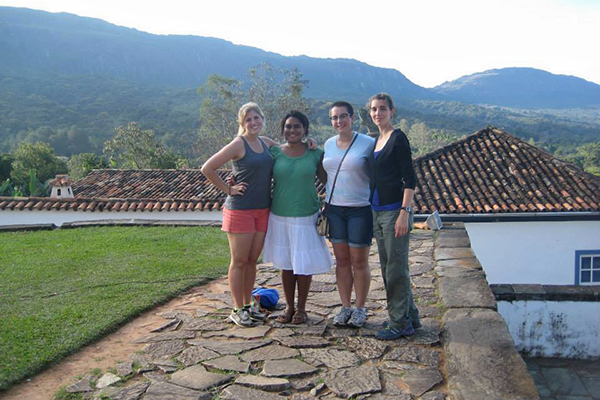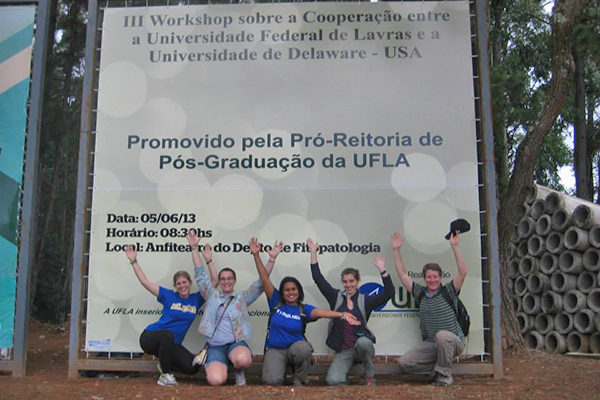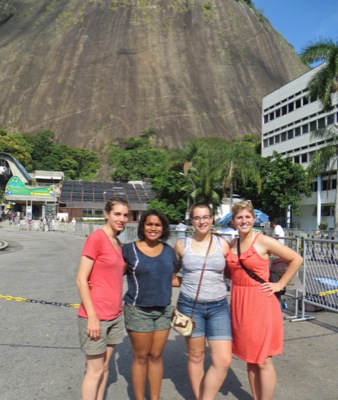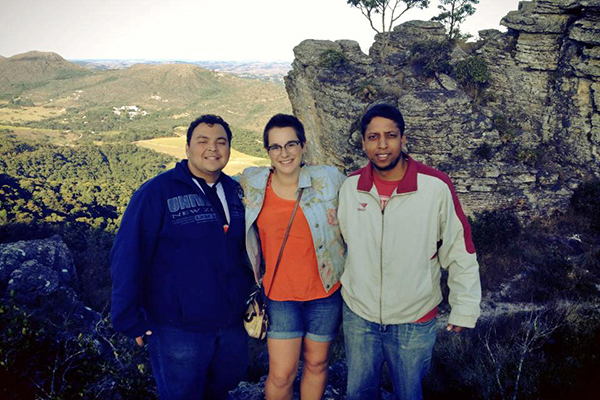UFLA ties
UD students, professors make global connections in Brazil
12:03 p.m., Oct. 2, 2013--Four University of Delaware students from the College of Agriculture and Natural Resources (CANR) spent time this summer interning in Brazil at the University of Lavras (UFLA), immersing themselves in the Brazilian culture and taking part in experiential learning with the hope of establishing connections for future collaborations with the institution.
The students were able to study in Brazil thanks to funds provided by a three-year, $150,000 grant from the U.S. Department of Agriculture’s National Institute of Food and Agriculture and International Science and Education program awarded to CANR and the College of Arts and Sciences in 2011.
Global Stories
Fulbright awards
Peace Corps plans
The students who went on the trip were Jacqueline Hoban, a junior studying wildlife conservation and entomology, and recent UD graduates Melanie Allen, who studied wildlife conservation, Sara Laskowski, ecology, and Sarah Thorne, animal science.
Laskowski said that in addition to learning about the research underway at UFLA and networking to globalize UD, the students were fully immersed in the culture as they all lived with Brazilian doctoral or undergraduate students and tried their best to speak Portuguese.
Laskowski, who stayed in Brazil for two months, said that her favorite part of the experience was “the people I met. I made really great friends who I hope to stay in contact with for a long time. I hope to go back and I’m looking into possibly getting a master’s degree in the Amazon region. I love it.”
She also said that she enjoyed sitting in on various classes, talking with professors, seeing new species of birds and insects, and learning about new plants on a day-to-day basis.
Laskowski said that traveling and studying abroad “gives you a new perspective on life. UD has a lot of great opportunities through the study abroad program, which gives students an opportunity to step outside of their roles and really see how other people live.”
Hoban explained that the interns had worked for a year before heading to Brazil to help build longstanding academic programs and research partnerships with UFLA that will enhance the international nature of curricula in areas of common interest, such as food security, bioenergy, animal agriculture and biodiversity.
“Most of my classes were plant based and I worked with plant pathologists and learned a lot about coffee, because that’s their big crop,” Hoban said. She also studied how her Brazilian colleagues “deal with different pathogens and how we would deal with any pathogens that would come from Brazil, or have come from Brazil, to the United States.”
Hoban said that she enjoyed traveling to Rio de Janeiro and exploring UFLA’s new coffee science department.
Having been on study abroad trips to Cambodia and Vietnam before heading to Brazil, Hoban explained that traveling and studying abroad “makes you realize how big the world really is and how different it is. When you read about another country, you’re not really getting a full view of their perspective. Seeing how Brazilians feel about Brazil, how Brazilians feels about the United States, it broadens your mind.”
Professorial experience
The students were also supervised by a faculty team that included Sue Barton, associate professor in the Department of Plant and Soil Sciences and a Cooperative Extension specialist; Carl Schmidt, professor in the Department of Animal and Food Sciences and associate professor of biological sciences; Greg Shriver, associate professor in the Department of Entomology and Wildlife Ecology; and Angelia Seyfferth, assistant professor in Department of Plant and Soil Sciences.
Barton traveled to Brazil for five days, and explained that she went for a number of reasons, among them to touch base with the UD students and provide them with the opportunity to do things like travel to Inhotim, a 5,000-acre botanic garden and contemporary art museum located two hours from the city Belo Horizonte.
As a professor who teaches plants and human culture, Barton also spent time with an ornamental horticulture professor from UFLA, driving around and looking at the typical city landscape in Brazil. Most of the plots in the city had very little room to landscape or walls that hid their interiors for security purposes, and because of this, people were not able to landscape the area in front of their homes. Barton was able to see a gated community, however, that eliminated the security issue with the gate at the entrance and that looked relatively similar to a high end American urban or suburban development.
Barton was also able to meet with forestry officials who showed her a number of urban forestry projects. “They’re very advanced in the way they’re using computers -- like tablets -- to collect data and they’re trying to completely catalogue all the trees in Belo Horizonte, which is a city about two hours away from Lavras,” said Barton.
She explained that the officials are gathering data on each tree and the possible problems that trees face in an urban environment -- such as wires near the trees -- and that they are hoping “to get a handle on the full range of the trees in the city and then continue to track that over time.”
Schmidt went to Brazil to support the students and to conduct research as part of a $4.7 million National Institute of Food and Agriculture (NIFA) climate change grant for a project titled “Adapting Chicken Production to Climate Change Through Breeding.” The project looks at identifying genes that help chickens survive on different diets, in different climates and facing different disease challenges.
Having already sampled birds in Uganda, Schmidt said that it was very beneficial to be able to get genetic samples from birds in Brazil, as well.
“I’m very interested in pursuing worldwide genetic diversity in chickens because they’re in all sorts of different environments -- they’re pretty much anywhere you find people,” said Schmidt.
Aiding Schmidt in his research work were Janet DeMena, a research associate in CANR, and Allison Rogers, a master’s degree student in CANR.
When it came time to head to campus and help the students, Schmidt quickly realized that the students were very self-motivated. He was, however, more than happy to accompany them on their trip to Rio de Janeiro.
“The people at UFLA were great and we were working pretty hard the whole time we were there, but I have to admit, it was nice to have a break in Rio,” said Schmidt.
Having been to UFLA during spring break, Schmidt had already set up connections with faculty at the institution in anticipation of this trip, and he will now have two Brazilian graduate students from the university travel to UD to spend a year here starting this month.
Article by Adam Thomas














